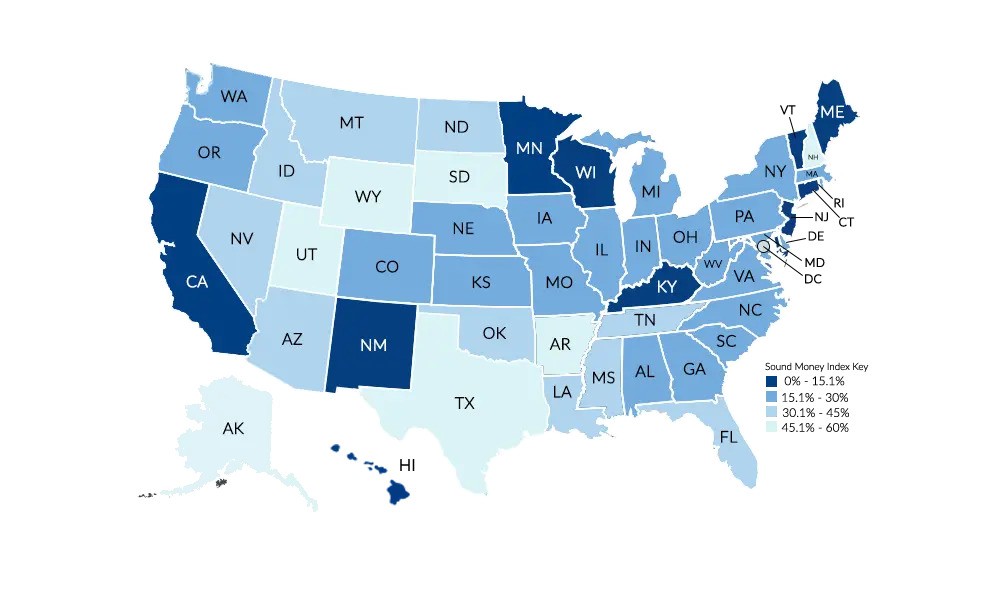(Money Metals News Service) The Sound Money Defense League (SMDL) is celebrating its 10th anniversary in 2024, marking a decade of relentless advocacy for the remonetization of gold and silver as legitimate currency.
Jp Cortez, Executive Director of SMDL, joined Mike Maharrey on the Money Metals Exchange podcast to discuss the organization’s mission, achievements, and the ongoing fight against taxes on precious metals.
According to Jp Cortez, “The Sound Money Defense League, celebrating its 10th anniversary in 2024, is a national nonpartisan group focusing on remonetizing gold and silver as money. The primary obstacle to using gold and silver as money is the taxes on their use and purchase. Our work involves eliminating these taxes and educating legislators across the United States about the importance of sound money.”
(Interview Begins Around 5:41 Mark)
A Decade of Advocacy
Established in 2014, the Sound Money Defense League is a national, nonpartisan public policy group. It focuses on eliminating the taxes that hinder the use of gold and silver as money. Cortez highlighted that the most significant barrier to using precious metals as currency is the taxes imposed on their purchase and use, including sales tax and capital gains tax. The SMDL’s primary goal is to eliminate these taxes state by state and, to some extent, at the federal level.
Jp Cortez mentioned that the Sound Money Defense League has had significant legislative successes in multiple states. Specifically, he highlighted that there are currently five states in the country that still charge taxes on precious metals, indicating that the majority of states have benefited from their advocacy by eliminating such taxes
The Tax Battle

Cortez emphasized the adverse effects of taxes on precious metals, explaining that they create practical obstacles for people wanting to use gold and silver as money. He pointed out that only five states currently charge sales tax on precious metals, and these states are losing revenue because buyers are either shopping across state borders or online to avoid taxes.
In states with taxes, events like coin shows avoid doing business, resulting in lost economic activity. Cortez argued that eliminating these taxes could potentially increase state revenue by attracting more business and economic activity.
According to Cortez, “Most states view taxes as revenue streams. Eliminating the tax on gold and silver could actually increase state revenue because it would attract more business, such as coin shows, that avoid states with such taxes. Concerning intentional barriers, it’s more likely that state politicians are unaware of the issues surrounding sound money rather than deliberately opposing it. The classification of gold and silver as collectibles by the IRS may also influence state policies.”
Jp Cortez went on to say, “The reason that gold and silver are not money is because of the taxes that surround their use and their purchase. So the first thing would be to eliminate these taxes. This is the single biggest point of friction that exists more than whether or not states have bullion depositories more than whether or not they’ve reaffirmed legal tender status or anything like that, the actual practical obstacle in the way of people using gold and silver as money are the taxes that surround its use.”
The Educational Mission
A significant part of SMDL’s work involves educating state legislators. Cortez noted that many state politicians have never considered the concept of sound money. SMDL educates these lawmakers on the importance and benefits of using gold and silver as money. The organization also works to pass legislation that supports sound money, such as bullion depositories and legal tender laws, and opposes the implementation of central bank digital currencies (CBDCs).
Jp Cortez said, “The concept of sound money has largely escaped the American cultural consciousness, unlike in Asia, where gold and silver are commonly sold and bought even by younger demographics. Much of SMDL’s effort is focused on educating both the public and legislators about the value and utility of sound money.”
Grassroots Mobilization

Cortez highlighted the importance of grassroots mobilization in their legislative efforts. By leveraging the extensive customer base of Money Metals Exchange, SMDL can quickly mobilize constituents to contact their state legislators about key bills. This direct involvement often makes a significant impact on the outcome of legislative battles.
Success at the State Level
Cortez explained why SMDL focuses on state-level legislation rather than federal initiatives. State-level advocacy is more effective and feasible due to the closer connection between constituents and their representatives. He cited examples of successful state-level campaigns, such as Tennessee, which has seen multiple pro-sound money bills pass after initial success in eliminating sales tax on precious metals.
Challenges and Future Outlook
The podcast also touched on the broader challenges of promoting sound money. Cortez acknowledged that while there is growing awareness and interest in precious metals as a savings medium, using them as transactional currency faces hurdles due to economic principles like Gresham’s Law. People prefer to spend less valuable currency and save valuable assets like gold.
However, the rise of innovative financial products and technologies, such as digital gold and physical fractional gold, shows promise. Cortez believes that the market, free from regulatory obstacles, will naturally gravitate towards sound money.
The Sound Money Index

One of SMDL’s notable projects is the Sound Money Index, an annual report that ranks states based on their sound money policies. This index considers various factors, including tax policies, legal tender laws, and state reserves of gold and silver. Cortez mentioned that the upcoming 2024 index would reflect significant legislative successes, potentially shaking up the rankings as states like Utah, Tennessee, and Kentucky have made substantial strides in recent years.
Grassroots Action
Cortez urged listeners to get involved in the sound money movement by supporting SMDL, staying informed through their website, and participating in grassroots campaigns. He emphasized that state-level activism can have a profound impact on policy and encouraged individuals to voice their support for sound money legislation in their states.
The Sound Money Defense League continues to lead the charge in advocating for the remonetization of gold and silver, celebrating a decade of success and gearing up for future battles. Through education, legislation, and grassroots mobilization, SMDL aims to restore the role of precious metals in everyday commerce and safeguard economic stability.
For more information, visit Sound Money Defense League and Money Metals Exchange.

